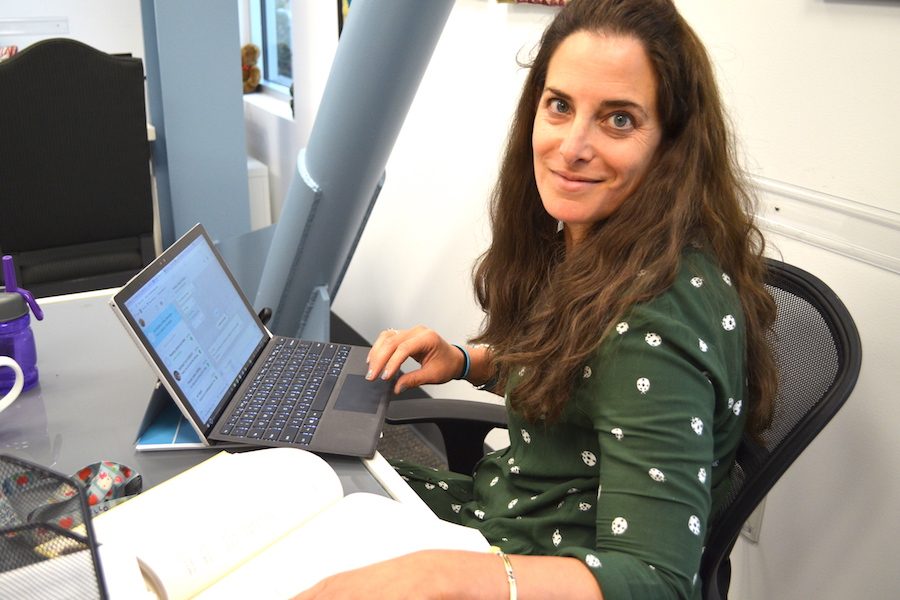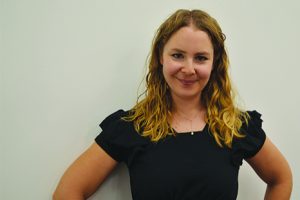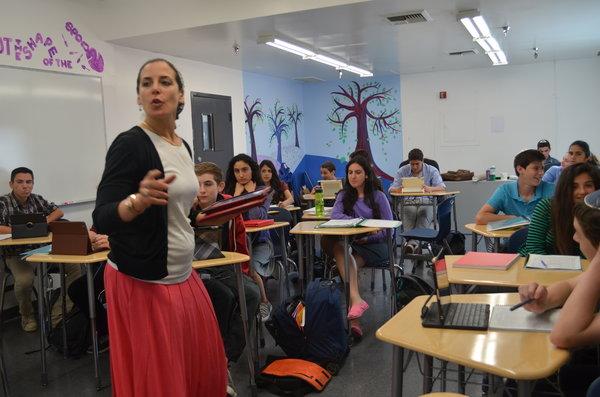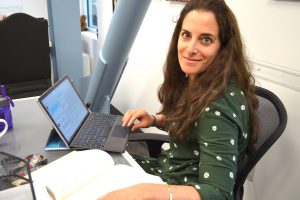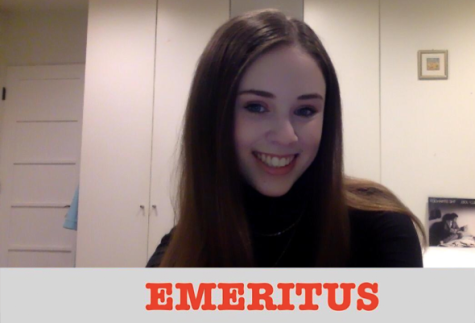Yoetzet Segal moves to Israel, will keep some roles at Shalhevet
BP Archive Photo by Alyssa Wallack ’20
ROLE: Yoetzet Halacha Atara Segal will continue to be Shalhevet’s Israel gap-year advisor for the class of 2021.
November 22, 2020
Yoetzet Halacha Atara Segal may have moved to Israel this summer, but she is still continuing her work with the Shalhevet community.
The Segal family moved on Aug. 5, although Yoetzet Segal’s husband, Head of School Rabbi Ari Segal, will continue to commute to Los Angeles. Ms. Segal said she would be teaching in Jerusalem at Midreshet Torah V’Avodah, an institute of Torah study for women where some Shalhevet alumni have studied after high school.
Although she will still lead gap-year advising for seniors and work individually with certain other students, Ms. Segal will no longer have an on-campus presence. She said those roles could be handled from Israel.
“I think corona has taught us all that many things can be done distanced that we didn’t realize,” Yoetzet Segal said in a telephone interview from her new home in Modi’in. “The coronavirus did highlight how that’s the kind of thing that can be done over Zoom pretty effectively.”
She also plans to host Shalhevet alumni studying in Israel for Shabbat, and will continue her work as Israel gap-year advisor for the class of 2021.
Yoetzet Segal said she and Rabbi Segal always wanted to make aliyah.
“It’s where we’re supposed to be,” Yoetzet Segal said. “People for thousands of years have literally died wanting to visit [Israel], and we’re so lucky that we have the ability to go there.”
Ms. Segal started working part-time at Shalhevet in the 2011-12 school year, and became full time in 2013. She taught ninth-grade Tanakh and Talmud, 10th-grade Talmud, 11th-grade Talmud, 12th-grade Tanakh and numerous minimester seminars, along with AP Statistics.
Yoetzet Segal took a sabbatical for the 2016-17 school year, when she studied fulltime to become Yoetzet Halacha, a title designated to women who have been rabbinically certified to make halachic decisions on matters pertaining to women’s bodies and marriage.
While these laws do not pertain directly to high schoolers, students said Ms. Segal made an impact in her yoetzet role, too. Alumna Natalia Shabtay ‘20 said she approached Yoetzet Segal multiple times with halachic questions on various issues.
“Ms. Segal always did her best to approach my questions from every angle that she could think of so that I could get the most comprehensive answer,” said Natalia.
“Having a woman with a serious background in halacha definitely benefited the school. It made it easier for me to ask halachic questions and having her as a Judaic Studies teacher was amazing because she always knew the perfect way to answer my questions.”
Breaking boundaries at Shalhevet, in 2018 Ms. Segal became the first female Judaics teacher to be given a title other than Ms. or Morah. She also became the first woman to teach Gemara at an Orthodox high school in Los Angeles when she started teaching 10th-grade Talmud in fall of 2013.
To achieve the title of Yoetzet Halacha, Ms. Segal studied at Nishmat, the seminary in Israel that created this role. She said there were more than 120 yoetzot halacha in the world, including 28 in America and three in Los Angeles. Now that Yoetzet Segal is in Israel, the latter number has gone down to two. There are also yoetzot halacha in Israel and London.
Yoetzet Segal said students who she taught at Shalhevet years ago ask her halachic questions, some when they are getting married. She also serves as yoetzet halacha of the Baron Hirsch Synagogue in Memphis, Tenn., and said she would continue her work there over Zoom.
She also organized Shalhevet’s women’s Purim Megillah readings.
“We’d have between 30 and 60 women come to the megillah reading,” Yoetzet Segal said to the Boiling Point. “People sometimes feel it’s a risk to put themselves out on a very public stage, and probably my favorite thing about it is that it’s a very safe and supportive environment for people to try something new.”
Senior Rebecca Cohen read Megillah on Purim in 10th grade and has been attending the readings since freshman year.
“They give girls an opportunity to take part in their traditions in a way that is meaningful,” said Rebecca. “They allow girls to participate in celebrating a holiday in a way that many of us have only seen men do, but now we’re able to do the reading ourselves and it gives us the power to take control over our own Judaism.”
Alumna Rachel Metzger ‘20 said Yoetzet Segal was influential in her decision to attend Hevruta, a gap-year program in Israel.
“Ms. Segal was able to tell me about programs that she thought would be a good fit for me,” Rachel said, “and I applied and started thinking more about it… I wasn’t thinking about it as much before.”
Junior Noah Masliah said he enjoyed Ms. Segal’s ninth-grade Talmud class.
“She had a lot of discussions in class which was really nice, we got to work in groups a lot, and if anyone ever had a question she was always happy to talk about the topic,” Noah said.
Yoetzet Segal said her favorite memories were of hanging out with students on the turf, and that what she’d miss most would be the Shalhevet community.
“People are just willing to try things — people want to make things work and they’re willing to support you when they work or when things don’t work,” she said. “That feeling of collaboration and support is something I’ll miss. It’s really this sense of community of people just wanting to make the best we can.”

